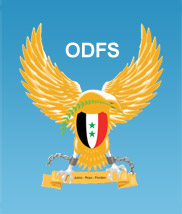ODFS Chairman condones European Parliament resolution on Syrian minorities but highlights glaring omission
Saturday, 3 May 2014 ODFS Chairman, Ribal Al-Assad
ODFS Chairman, Ribal Al-Assad
Vulnerable minority communities in Syria could be wiped out by the ongoing violence unless the international community does more to halt the bloodshed and create the basis for a diverse and democratic society in the country, the European Parliament has said in a resolution drawing attention to the plight of various ethnic and religious groups in Syria.
The resolution notes Syria’s long history as a multi-ethnic and multi-faith society that includes Arameans, Catholics, Armenians, Assyrians, Circassians, Kurds, Tukmens, Druze and Sunnis .
However, the 'Alawites' , 'Shias' and 'Ismailis' were the only groups not mentioned by the resolution.
MEPs highlighted the fact that many Syrians have avoided taking sides in the conflict, fearing that “if the government is overthrown, they will be targeted by jihadist rebels”.
The text approved by the parliament in Strasbourg “strongly condemns the increasing number of terrorist attacks carried out by extremist organisations and individuals in the country”, and demands that all parties to the conflict to “adhere strictly to international humanitarian and human rights law, and calls for the protection of all vulnerable communities, inter alia by allowing humanitarian access and lifting all sieges of populated areas”.
MEPs focused on a number of individual cases, including the murder of the Dutch Priest, Francis Van Der Lugt, in the besieged city of Homs in March.
The resolution also considered the future of Syria, expressing parliament’s view that the conflict can only be resolved through “a Syrian-led, inclusive political process with the backing of the international community.”
In addition, the resolution stressed “the importance of the participation and contribution of all parts of Syrian society, including ethnic and religious minorities, in this process, and underlines the crucial role of minorities in preserving the unique cultural heritage and the tradition of inter-cultural, inter-ethnic and inter-religious coexistence in Syria, with the aim of creating a vibrant society for future generations of Syrians.”
The wider regional context also featured in the resolution, with MEPs expressing “grave concern at the profound consequences of the fragmentation of Syria for the stability and security of the region, particularly in Lebanon and Iraq.”
Commenting on the resolution, ODFS Chairman Ribal Al-Assad said:
"I welcome the European Parliament's typically strong statement of support for a diverse, inclusive and moderate Syria. This is a critical time for every minority group in the country.
Unfortunately, the resolution omitted three important groups: the 'Alawites' , the 'Shias' and the 'Ismailis'
I am sure this was a careless error rather than a deliberate exclusion. It is true that Shia groups have fought alongside the Regime. It is also true that both Alawites and Ismailis are very close to the Shia sect.
The President is, of course, an Alawite, but it would be a travesty if his own sect led to a deliberate persecution of the peaceful majority who share it. This would play into the hands of the regime and its Islamist opponents, both of whom benefit from the ever widening sectarian divide in and around the country.
These groups are simply among those threatened Syrian minorities who we should be trying to protect, irrespective of their nominal political affiliations.The majority of them have always supported a free and democratic Syria, because they know that a genuine democracy is the only way to protect minorities .
But as the opposition has grown ever more extremist and threatening, these three groups, along with other minority groups, have been forced to side with the Regime. This is a natural reaction to being faced by fatwas from clerics who called them 'infidels' and who called on jihad against them (as well as Christians and Jews).
Attacks on Alawite, Shia, and Christian villages continue, and civilians have been kidnapped or killed. On the 30th of April, for example, the jihadist group al-Nusra Front claimed responsibility for twin car bombings the day before, that killed at least 79 civilians in the Alawite-dominated al-Zahra neighborhood of Homs. Al-Nusra ended its statement with an ominous threat: "We promise the Alawites and all of those who support them that there will be MORE to come."
To exclude any persecuted group under this sort of threat is not in the best interests of Syria, the region, Europe or the world.
The Regime in Damascus is abhorrent. But the E.U., along with the international community, must not take sides on sectarian grounds. Nor should it understate the terror of the Islamist opposition whose modus operandi is to create an Islamic Caliphate state under Sharia Law, and to kill anyone who does not share their perverted ideology. The means to this end is to replace a dictatorship in Syria with a Theocracy. Our role in the West must be to ensure that when change happens, it involves the introduction of a genuine democracy.
Syria has been, and still should be, a beautiful mosaic of religious and ethnic diversity. Instead, it has become a war zone dominated by sectarian violence. Totalitarianism and extremism can only be defeated by liberal values and a genuine pluralism. That means freedom for every group that shares those values, irrespective of any individual within them who does not. That is why the exclusion of Alawites, Shias and Ismailis from this resolution is a glaring omission and I urge the European Parliament to rectify it in the name of diplomacy, freedom and democracy."
More news articles

